“Out of chaos comes dancing stars.” Nietzsche

Last week, I found this quote in an old journal. While I much prefer say, Einstein, for physics-related wisdom, these words absolutely sang to me.
You see, I’ve been thinking a lot about chaos lately. It happens every May.
I look at my garden and can’t help dwelling on all the chaos-creating weeds—growing much faster than my food crops.
The biggest culprit, which I view with special despair, is the impossible-to-eradicate horsetail.
Regardless of the weather, in our area those buggers grow an inch or so every day. But horsetail’s true chaotic genius: when you pull on its tricksy roots they just break right off, while the far-below-the-surface runners just chortle.
Following that time-honored advice to know thy enemy, I Googled it. (Chaos theory, not horsetail.) In less than a minute, trying to get my head around the various definitions of chaos theory, I knew I was swiftly, and unnecessarily wandering off into the weeds.
Because c’mon, chaos is easy to identify: you know it when you see it!
But circling back, it seems to me gardening is nothing but trying to impose order on the utter chaos that is Mother Nature.
Still, your garden’s pleasures are everywhere, in vibrant apple blossoms, a row of healthy spinach seedlings, or a freshly transplanted pot of bee balm.
While raising food crops does take a lot of elbow grease (duh), in my mind it’s even more important to be stellar at letting go of all the weeds and and bugs and chores…
In that letting go, you find your garden’s dancing stars.
I’ve always loved the night sky unreservedly—(unlike my mixed feelings when I look at my chaotic garden). I’m completely entranced by the chaos that is the firmament of stars upon stars upon stars.
My dad, an inveterate stargazer, introduced me and my siblings to its wonders.
He was a paradox—a cerebral, dedicated academic, and a devoted, hands-on daddy. When I was a child, he made sure my siblings and I got our daily liquid vitamins, that we ate our vegetables, and who came to comfort us when we cried in the night.
One morning, when I was about six, he roused my sisters, brother and me before dawn, wrapped us in blankets and piled us into our red Ford station wagon. It was still dark as he drove out of St. Cloud, Minnesota proper and into the boonies.
Dad wanted us to view a comet.
Watching my dad peer intently through the windshield, I, like my siblings, was too young to even grasp what a comet was—especially my brother, who was just a tot. And we never did actually see the comet. But that pre-dawn excursion has always stayed with me.
He tracked every notable celestial event. When I was seventeen, coming home late one night, he emerged from his downstairs study and said to me, “The northern lights are out—let’s go take a look.”
I was one of six kids by then, and one-on-one time with my dad was rare. But I still recall that moment, standing side by side with him on a frosty autumn night, gazing at the pulsing, neon-green lights of the aurora borealis.
Dad was an inveterate night owl—he wrote political tomes at night—and was always extremely short on sleep. Yet he was always happy to give it up for star-viewing.
It’s funny that for all his ferocious work ethic, he was surrounded by chaos. Not from we kids, who of course generated plenty of our own, but his workspace.
Generally as far from the family hubbub as possible, his study, wherever we lived, was bursting at the seams with clutter. Yet it wasn’t random clutter, but purposeful.
The linoleum floor, his small, blond-wood desk, his reading chair, and his grandmother’s antique divan was piled high with books, manuscripts, notes, and student papers—all dwarfed by loads of newspapers and newspaper clippings.
The very walls seemed to groan with the overload.
Given his immense productivity as an author—he wrote four hours a day and encouraged me to do the same—he basically had no leisure time. Yet he viewed each and every meteor shower, particularly the Perseids.
Around midnight, he’d leave his typewriter, emerge from his newsprint-lined cave of chaos and invite any family member who happened to be around (even as adults, we kids were in and out of the family home a lot) to sit on the deck with him and watch for meteors.
Whenever I see a shooting star, I always think of my dad. I was actually going to write about Irish stuff this month…then last night, something happened to change my mind.
Right before bed, as I often do, I glanced through the dining room window at the clear sky.
In that instant, Boom. A spectacular meteor streaked earthward. Of course I thought, Hey, Dad.
I guess he wanted me to write about stars.
He passed away one August night at the stroke of midnight, under the peak hours of the Perseids. I like to think of him up there for always, among the dancing stars.
Chaos Agent 1-Year Anniversary
It would be just lovely to have my head in the clouds—or the stars—whenever possible, daydreaming about the novel I just started writing.
But our little homestead has a way of bringing me down to earth. And this week came my spring wake-up call.
I generally keep abreast of what large mammals are out and about by the scat on the road. (Not the deer—they take care of business in the woods.)
I’m talking about the apex predators who pretty much stay out of sight: bobcats, coyotes, and cougars.
Plus the big kahuna: bear.
And now that the weather has warmed up, and the bears are out of hibernation, I’ve been watching for their scat.
Generally, from May through October, our mile-long lane is liberally scattered with it, say, every 100 yards or so. You’ll pretty much always know when bears are out foraging. To me, the math should be super-simple: no scat = no bears!
Since I hadn’t seen so much as a scoshe of bear sign this spring, I was lulled into a false sense of security. Until four days ago.
Heading to the woodshed, where we hang our outdoor compost bucket from a beam, I was ready to add the previous day’s kitchen scraps to the bucket—then checked my step.
I found it lying sideways on the ground, its contents littering the wood-scrap covered shed floor.
I collected the kitchen scraps out of the wood bits, piling them back in the bucket. There were the usual carrot peelings, eggshells and coffee grounds—but something was missing.
I knew my husband John had been eating an apple a day all week—so where were the cores?
I got a sinking feeling…
Now, you understand we’ve hung that particular bucket on that particular beam for nine years—ever since I saw a rat lurking around our shop.
That arrangement has weathered many a storm—be it a Northeaster’s Arctic blast of 40-50 mph, or a cyclone-like sou-wester off the Pacific, topping out around 65 mph or more.
Those winds had never blown that bucket off its hook.
The only other time I’d seen the bucket knocked off the hook was last summer—when a certain chaos agent had meticulously picked out all the peels of two baked sweet potatoes.
This time, I so wanted to believe a raccoon had done the deed—although in our 18 years in the Foothills, I’d never once seen a raccoon in the area. Odd were, it was not a raccoon.
That meant it had to be…
Yesterday, I crossed paths with our favorite neighbor in his Prius, who lives on the 10-acre property next to ours. We exchanged our usual pleasantries, and inquired into each other families—then Alan dropped the bomb.
“You won’t believe who’s back,” he said in his soft Texas drawl. “Remember when the bear attacked our bird feeder?”
My sinking feeling returned. “I remember all right. Last July.”
Neither of us needed to identify which bear had hit the feeder. It was the bear—the critter that had made my life—and garden—a misery all last summer.
“Well, three days ago,” he said, “the bear got our bird feeder again, and ate every last grain of birdseed.”
Oh, no.
“That’s not all,” said Alan. “You won’t believe it, but yesterday, the feeder was gone. He stole it!”
Mystery. Solved.
I knew exactly what critter had knocked down our bucket, and meticulously extracted all the apple bits.
Alan and I conferred about ways to handle this nuisance, without determining an actual plan, then I biked the last 3/4 mile home and told John.
It’s been one year since the bear first started to wreak havoc at our place—making regular visits to our garden from May until mid-October.
It does remain a mystery why I haven’t yet seen bear scat yet on the road, when every other year, the neighborhood bears have so reliably made their presence known.
Not that it matters. Both John and I, and our neighbors, will need to take stronger measures to safeguard our homesteads this summer.
After the bear got our strawberries last June, I for one, am determined to protect what’s looking to be a splendid strawberry crop next month… I’ll keep you posted.
Last summer’s bear saga starts here!
ICYMI Department: Chickens!
My brand-new book, a memoir of nature, wildlife, and chicken-caring is out this week… Little Farm in the Henhouse!
Little Farm in the Henhouse: A True-Life Tale of Hen-Keeping Homestead-Style brings you the joys and challenges of keeping a backyard flock of laying hens.
You’ll discover the magic and teachable moments of raising hens in the middle of the woods—and learn lots of practical tips and best practices for keeping chickens healthy and happy!
You’ll find a sample of “Henhouse” in my March Chicken Issue, and it’s available by request at your local public library!
The book is at all retailers too—but if you like shorter reads, there’s a free bonus mini-ebook as well in my Chicken Issue… Little Hen in the Foothills: The True Story of Miss Broody, the Brave Little Blond Hen. I hope you’ll take a look.
Gardening, Food, and life’s lovely moments—so much to enjoy!
I’m so grateful for the wonderful stories from Prue Batten, especially her recent home landscaping adventures at
, Erin’s beekeeping and garden wisdom at , and for foodies, improvised suppers and gorgeous pastries at Ciara Ohartghaile’s Irish …And thank you so much for reading Little Farm Writer!
~Susan, in the Foothills




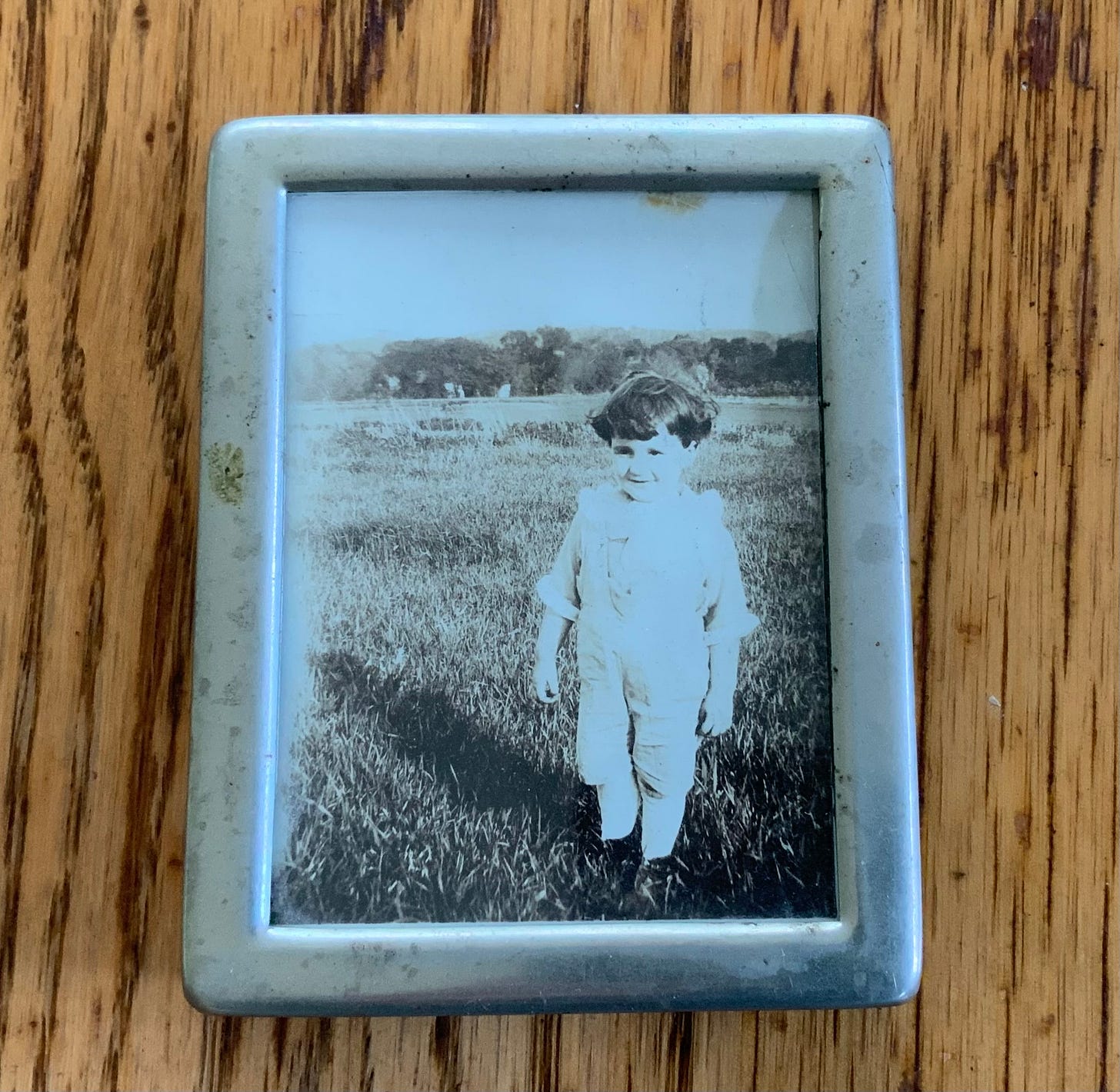
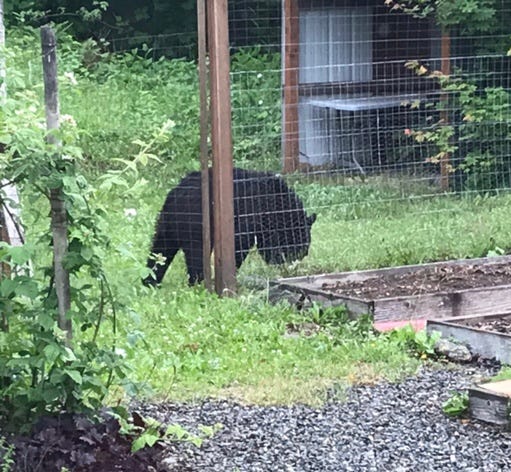
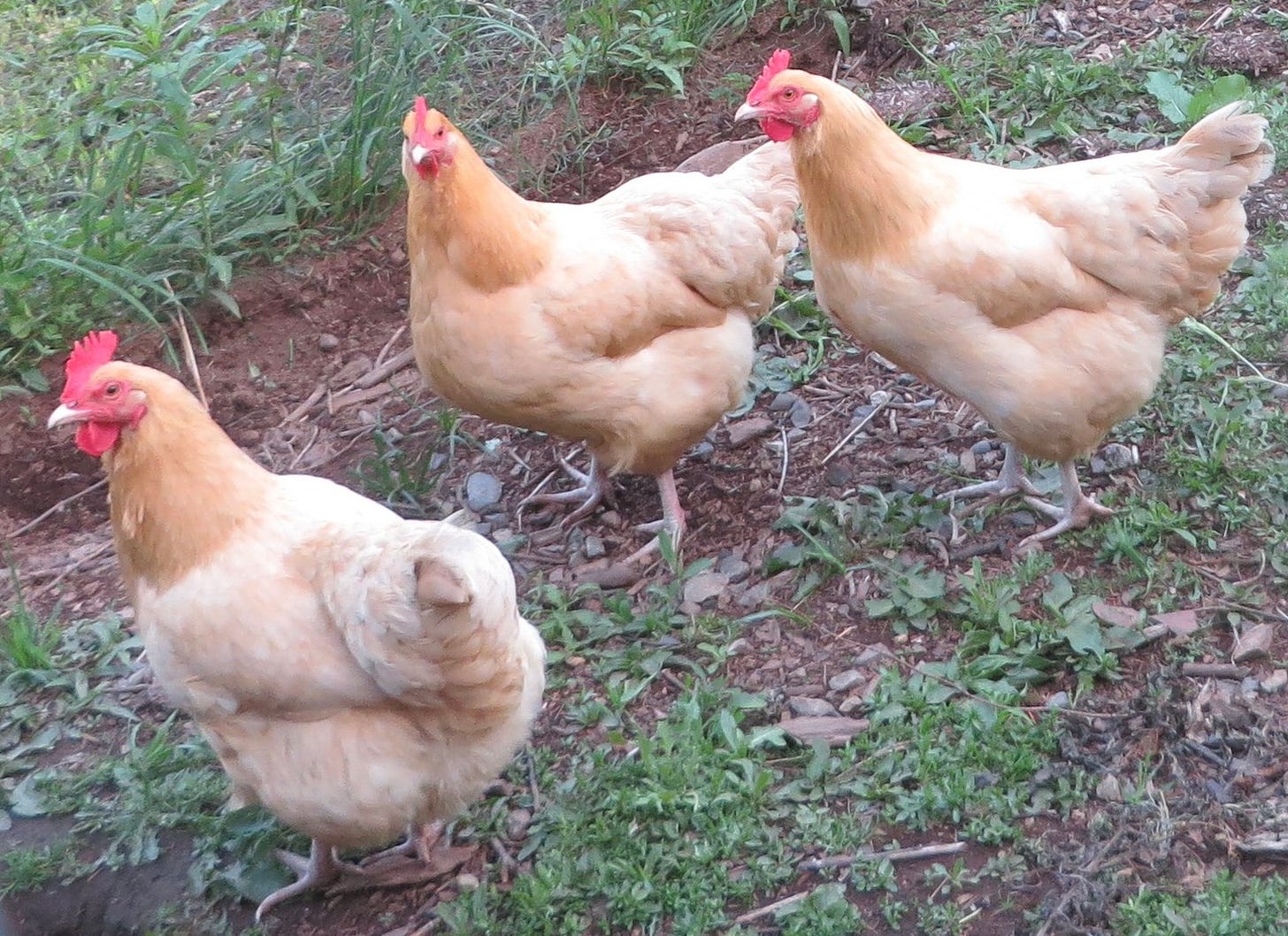
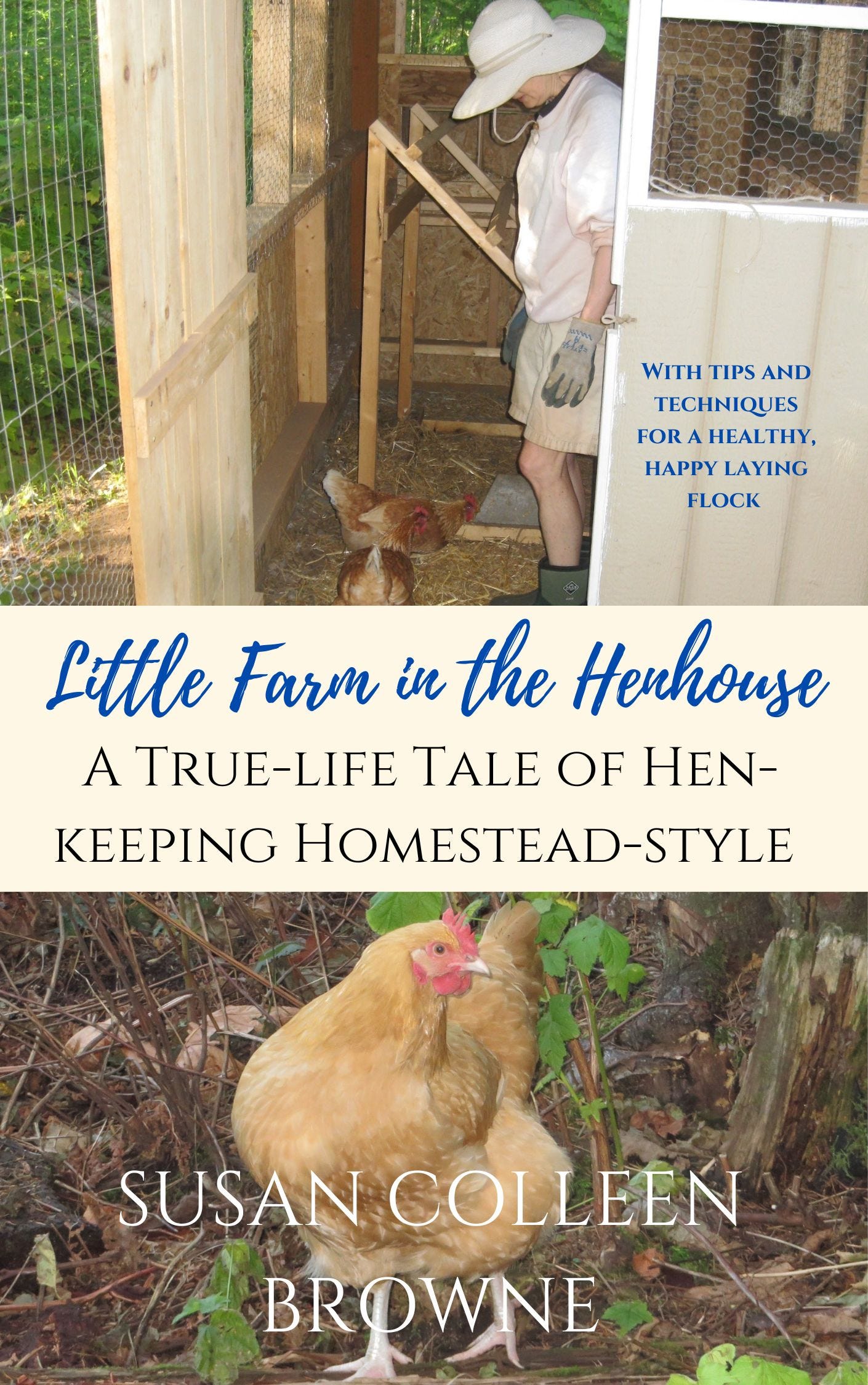
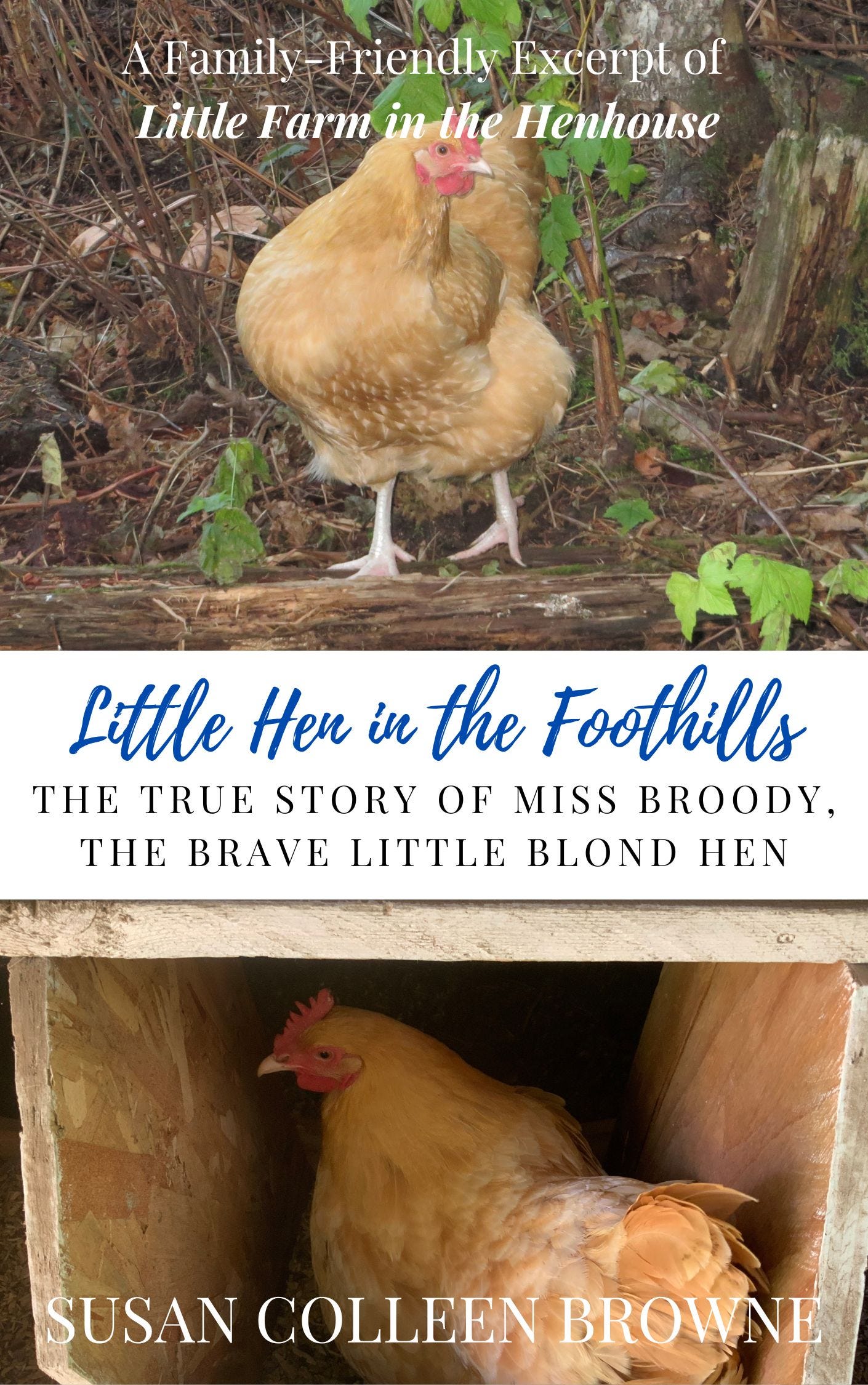
An absolutely adorable story, Sue. The material about your Dad was precious; so appreciated. He was an unusual fellow that should have received more accolades and awards over his lifetime. Jim Davis was a paragon scholar and a hands-on Dad when fathers simply did not relate to their younger children in close-up situations.
The rest of the story -- bears be gone. I hope you and your neighbor can devise a strategy to get that guy out of your lives!
“What is lovely never dies, but passes into another loveliness, star-dust or sea-foam, flower or winged air.” —Thomas Bailey Aldrich